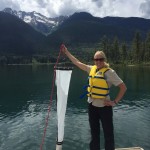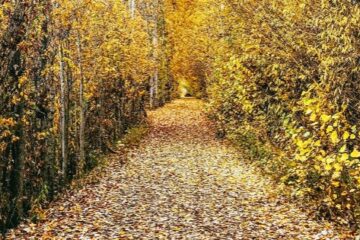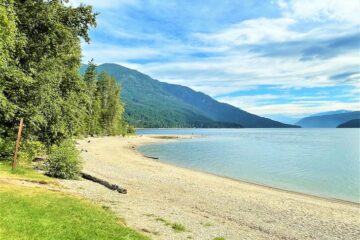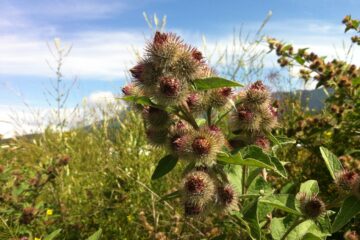No Invasives Mussels Detected in 2016!
Protecting Our Waters from Zebra and Quagga Mussels in the Columbia Shuswap
Photo Caption: Laura Gaster, the CSISS Aquatic Invasive Species Program Coordinator, samples for invasive mussel larva (veliger) in Trout Lake as part of the early detection program to protect our waters. To date, no invasive mussels have been detected in the Columbia Shuswap.
The Columbia Shuswap’s beautiful lakes, rivers, and wetlands are threatened by an aquatic invader: invasive Zebra and Quagga mussels! Thankfully, this summer, no mussels were detected in the 35 samples collected by the Columbia Shuswap Invasive Species Society, in partnership with Ministry of Environment. “We are thrilled with these results, and hope to continue to raise awareness about impacts of invasive mussels, to prevent their introduction into BC,” says CSISS Executive Director Robyn Hooper, “as well, we are thankful for our partnership with the Province and support of the Columbia Basin Trust to complete this work.”
Aquatic invasive species are a major concern for British Columbia, and the Columbia Shuswap region is no exception. Currently the largest threat to BC’s freshwater is the Zebra and Quagga Mussel, which has been estimated to cost the province $43 million dollars annually, if an infestation were to occur. These mussels are less than 2cm in size and quickly form dense clusters that can interfere with the flow and quality of water.
Zebra and Quagga mussels reproduce and spread rapidly making it impossible to remove them from large bodies of water or connected waterways. Mussel larvae, or veligers, are invisible to the naked eye and disperse naturally by downstream currents, or in boat ballast systems. As they grow, they attach to hydro infrastructure, aquatic plants, boats, motors and recreation equipment.
What is the current status of the lakes and rivers in the Columbia Shuswap region?
During the 2016 field season, CSISS collected 35 veliger (mussel larva) samples and surveyed 22 priority water bodies in the Columbia Shuswap region in collaboration with the Ministry of Environment and the Columbia Basin Trust.
The results are in! No Zebra or Quagga mussel veligers were found in any of the samples collected by CSISS and there are no known cases of invasive Zebra or Quagga mussels in the Province of BC. “These surveys provide valuable information that is essential for the early detection and rapid response program,” says Laura Gaster, the CSISS Aquatic Invasive Species Program Coordinator, “The Zebra and Quagga mussels would have devastating consequences for our economy and environment that is reliant on pristine fresh water systems.”
What are the impacts of Zebra and Quagga Mussels (ZQM)?
In the Columbia-Shuswap, access to clean water makes our community thrive. Invasive species such as the Zebra and Quagga mussels negatively impact the environment, economy and recreational uses of the affected communities. An invasive population of mussels can clog and damage any water intake system or infrastructure, including piping, boats, dams, and irrigation systems. The presence of mussels creates higher maintenance costs for multiple industries including: hydropower, municipal water supply, fishing, industrial, agricultural, tourism and recreation.
Invasive mussels cause severe ecological problems. They produce harmful wastes and deplete important nutrients causing a bottom-up reaction in the food chain, ultimately degrading water quality and reducing essential resources. Invasive mussels would threaten native biodiversity including wildlife and fish populations.
The tourism industry in the Columbia Shuswap depends on our pristine natural environment. A mussel infestation can seriously degrade the recreational opportunities in the Columbia Shuswap by putting the quality of the beaches at risk. As the mussel die, they wash up on shore, leaving the sand full of sharp and foul-smelling dead mussels.
What you can do to help
As a boat or watercraft owner, be sure to “Clean, Drain, and Dry” your boat before and after launching into a new water body to prevent the spread of any aquatic invasive species. You can also report invasive mussels by calling the Report All Poachers and Polluters (RAPP) hotline at 1-877-952-7277.
All watercraft users coming from out of BC are required to stop at provincial inspection stations, where decontamination may be required for infested or suspect watercraft. As of September 27th, 2016 90 watercrafts were ordered for decontamination this year by the Province’s inspection crews.
Learn more at:
https://www.for.gov.bc.ca/hra/invasive-species/mussels.htm
https://www.for.gov.bc.ca/hra/invasive-species/inspectionprogram.htm
https://www.for.gov.bc.ca/hra/invasive-species/inspectiondata.htm
What is CSISS?
The Columbia Shuswap Invasive Species Society is a non-profit organization dedicated to the prevention, management and reduction of invasive species in the Columbia Shuswap Regional District. In addition to field work, CSISS delivers education and outreach programs, such as “Clean, Drain, and Dry”. CSISS is thankful for the generous support of the Columbia Basin Trust, the Columbia Shuswap Regional District, and the Province of British Columbia.



